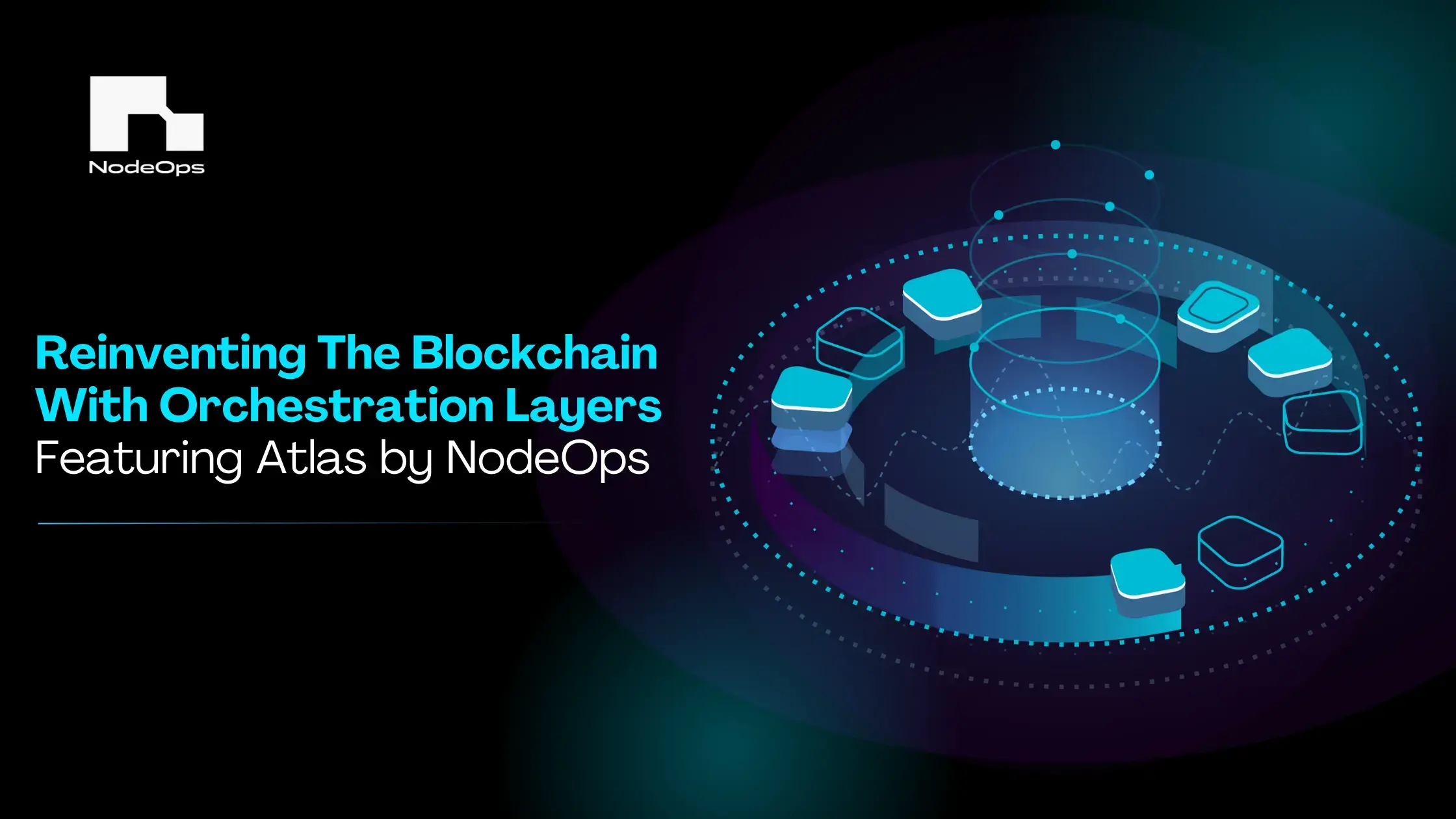As Web3 and blockchain tech continue to evolve, we know how difficult it gets to manage distributed nodes, ensure security, and scale networks across ecosystems. However, among these, infrastructure-related complexities remain one of the main challenges to tackle, and the orchestration layer has emerged as a vital solution.
By simplifying infrastructure complexities, the orchestration layer enables smoother, more scalable Web3 projects, positioning it as a cornerstone for the next phase of blockchain's growth and widespread adoption.
This blog post will discuss different types of orchestration layers and how NodeOps' Atlas stands out as a unique orchestration layer designed to address the challenges of decentralizing node networks.
First, Let’s Understand the Basics of Orchestration Layer
In the blockchain ecosystem, the orchestration layer is crucial for managing complex operations across multiple protocols and chains. It abstracts the complexity of the multi-chain operations, allowing different blockchains to interact seamlessly between nodes, data, and networks without manual interventions and errors. To simply explain, think of it as a maestro, synchronizing various tasks of the blockchain system like identity management, transaction processing, onboarding, and other asynchronous tasks.
By ensuring smooth communication between such blockchain components, the orchestration layer improves scalability, security, and efficiency in the multi-chain ecosystem and automates or “orchestrates” the data flow.
Types of Orchestration Layers
Let us discuss some of the various types of orchestration layers:
AI-driven orchestration
AI orchestration refers to coordinating AI components within a network, like models, data, and resources, to ensure enhanced interaction and automation. It streamlines the end-to-end life cycle of AI applications, from development to deployment. The benefits include improved operational efficiency, scalability, optimized resource utilization, continuous monitoring and engagement, robust security and compliance, and governance. For instance, QuillAI and Nimble Network are AI-based orchestration protocols.
Benefits of AI orchestration layer
Decentralized network orchestration
With the growth of decentralized applications in the digital ecosystem, deploying them requires smart scaling and load balancing to maintain performance and security. The decentralized orchestration framework distributes tasks across multiple nodes to improve the resilience and security of the blockchain.
Decentralized network orchestration layer in blockchain
Cross-cloud and multi-cluster orchestration
Many new orchestration tools are evolving to manage nodes across multiple cloud providers and clusters. Such orchestration helps synchronize and distribute workloads across platforms like AWS, Google Cloud, and MS Azure. Using cross-cloud and multi-cluster orchestration includes better reliability, high performance, and cost-efficiency.
Klaster Protocol is a decentralized P2P network that permissionlessly orchestrates complex multi-chain transactions.
Cross-cloud and multi-cluster orchestration
Edge computing and distributed orchestration
Edge computing is growing rapidly and requires distributed orchestration to manage geographically dispersed nodes in low-latency environments. Lightweight orchestration layers are being developed to handle increasing data volume from IoT devices. It reduces the load on the cloud with faster response times. Othentic, a Web3 orchestration and abstraction layer, orchestrates the distribution of a tech stack that allows developers to self-deploy custom computational services.
NodeOps is among the few NaaS platforms to leverage all the different types of orchestration for Web3 protocols and blockchains.
NodeOps’ Atlas and Its Main Functions
We know how the orchestration layer is a backbone for managing and automating complex multi-chain operations. As a leading Node-as-a-Service provider, we see several challenges with creating and managing node networks. To address these, we are working on our own DePIN orchestration layer, Atlas.
Atlas is NodeOps' decentralized and permissionless orchestration layer that transforms it into an open marketplace for decentralized node infrastructure. It provides robust economic security and scalability for blockchains, supporting Web3’s growth and node networks.
Here are some of Atlas’ main functions:
Onboarding and deployment
The orchestration layer simplifies onboarding for new Web3 projects looking to bootstrap their node network, diverse types of infrastructure providers, restaking Operators that bring in economic security.
Nodes of various Web3 projects, such as AI, Gaming, rollups, and many more, could simply deploy their nodes with the help of Node Bootstrapping. This eliminates manual setup and long waiting periods and accelerates the node operation.
Real-time monitoring
Atlas will use a collection of light clients called the NodeWatch network. These nodes will play a critical role in maintaining the integrity and performance of both providers and the nodes deployed, ensuring the protocol's Quality-of-Service .
Scheduling
Atlas will use an intelligent scheduling logic to determine the optimal provider based on specific parameters for each node deployment.
Incentivization and slashing
Atlas will use a dual-staking model to boost economic trust and reliability. Every Provider and Operator would get rewarded for their work with NodePoints.
About NodeOps
NodeOps is the leading infrastructure marketplace for Web3, allowing anyone to purchase, deploy, and manage a wide range of blockchain nodes. Our mission is to truly decentralize Web3. One node at a time. To achieve this, we are streamlining the entire node orchestration process and offer an easy-to-use platform for Web3 protocols, developers, and retail users to manage all their operational needs. With Atlas—our permissionless, decentralized infrastructure orchestration layer built as an AVS on EigenLayer—we're setting new standards in ease, speed, and security for infrastructure management. We support over 45 chains, created 28,800+ NodeFolios, deployed 45,900+ nodes, and manage assets worth $58.2 million .
Join NodeOps today and deploy your first node at nodeops.xyz, or follow us on X for the latest news & updates.

